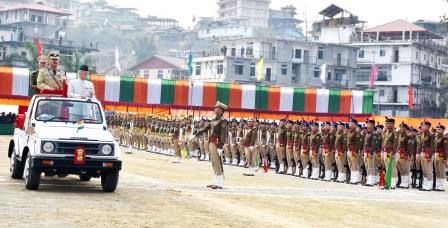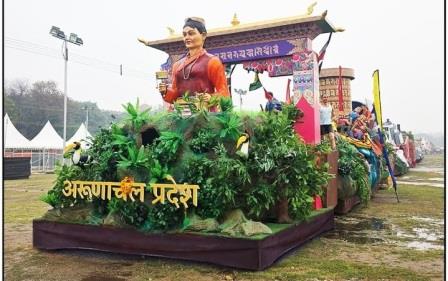-
 Arunachal celebrates 77th Republic Day with fervour
Arunachal celebrates 77th Republic Day with fervour
-
‘Local Food Contest’ marks National Tourism Day
-
AFTF reiterates scrapping of 80:20 recruitment ratio in Arunachal Pradesh
-
Governor, First Lady host ‘At Home’ reception
-
Papum Pare DA holds interaction with newly elected ZPMs
-
Indian Army conducts ‘Know Your Army’ campaign
-
 Arunachal tableau on R-Day spotlights state’s emergence as Adventure Capital…
Arunachal tableau on R-Day spotlights state’s emergence as Adventure Capital…
-
Etalin marks National Voters’ Day, encourages youth participation in democracy
-
Sona reviews PMGSY, VVP projects in Itanagar Circle
-
Lok Bhavan celebrates UP Diwas
The All Arunachal Pradesh Students Union (AAPSU) and its three Siang valley districts federal units have raised a fundamental question with the Government of India - why can’t it have a water treaty with China. The question came after the strange behavior patterns observed in the River Siang, which is the lifeline of Arunachal Pradesh. Credit goes to Ninong Ering, the MP from Arunachal East, who had tweeted about two potential ‘crises’ due to landslides across the border — first, the river would get dammed up naturally, reducing the flow of water into India, and then a ‘water bomb’ would be released once the ‘dam’ was breached. Though it happened as he predicted (his information coming from Chinese government itself), one day the river dried up and next day there was a water surge, fortunately it has not created any havoc.
But that does not mean we can remain silent as the contrary can happen in future. For the last couple of years, there have been reports of China planning many dams on Yarlung Tsangpo (River Siang or Brahmaputra) and its attempts to divert the river so that dams can be built. China, on the other hand, has been engaged in constructing world’s largest hydro-electric power projects exploiting the river resources. The Three Gorges dam on Yangtze River is touted to be the world’s largest one with an installed capacity of 22,500 MW. China has become world experts in such construction of dams with multi-purposes including irrigation, drinking water supply, etc.
The student bodies have a valid point thus. India has water treaties with neighbours like Pakistan, Bangladesh and Nepal, but none with China. This is one of the most neglected aspects of Indo-China relations. Or probably, the successive governments at the Centre did not find it important to arrive at a water treaty with China since the region remained isolated from the mainstream and it had no impact on mainland India. Remember, during 1962 war with China, Indian army was asked to withdraw down the Chicken Neck corridor. History is probably repeating and the students have raised the valid issue. Still, more remains to be done and it is for the regional politicians to act.

Kenter Joya Riba
(Managing Editor)She is a graduate in Science with post graduation in Sociology from University of Pune. She has been in the media industry for nearly a decade. Before turning to print business, she has been associated with radio and television.
Email: kenterjoyaz@easternsentinel.in / editoreasternsentinel@gmail.com
Phone: 0360-2212313

